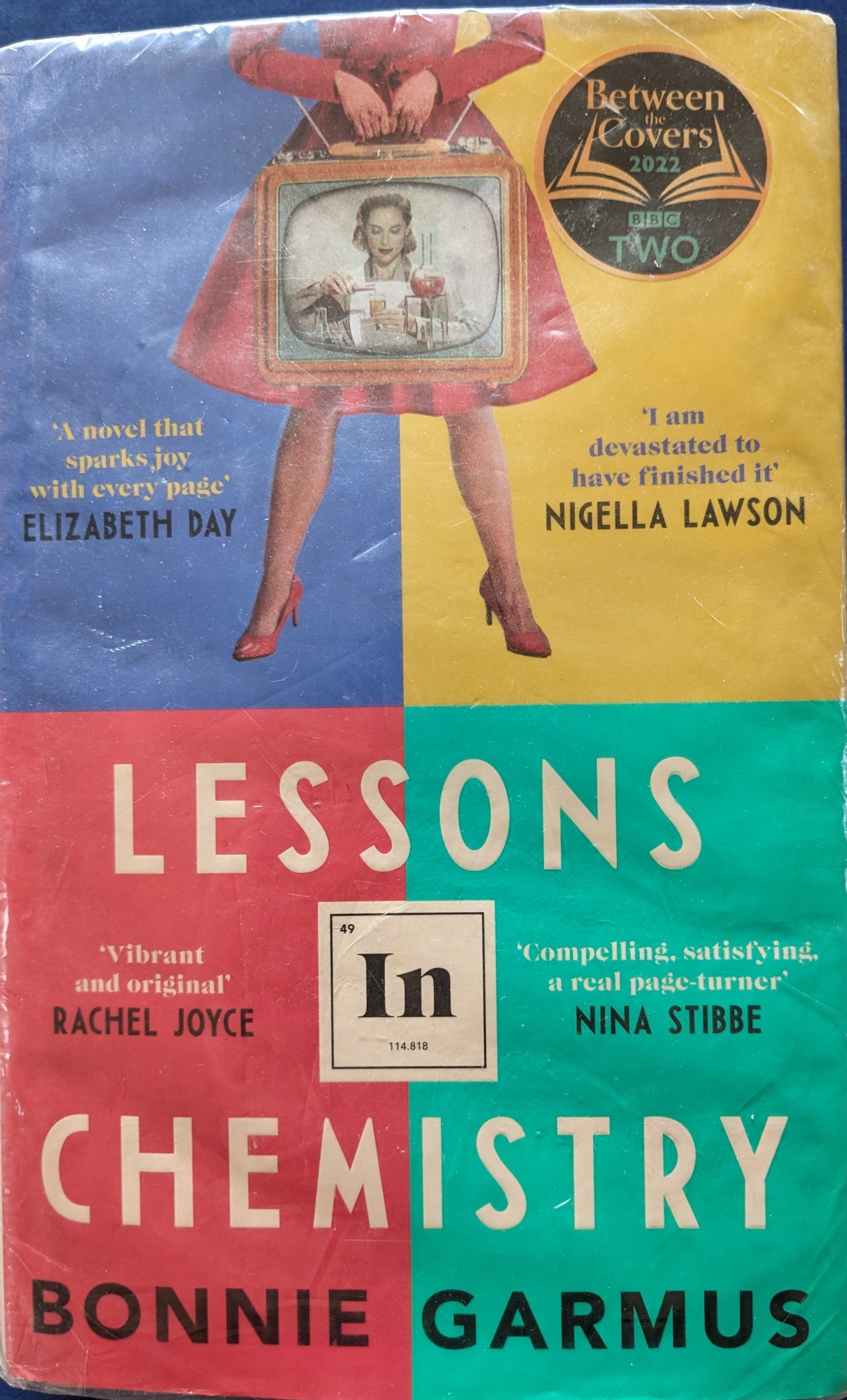
Chemist, Elizabeth Zott is not your average woman. In fact Elizabeth Zott would be the first to point out that there is no such thing. But it’s the early 60s …
Introduction to the author and book
Bonnie Jean Garmus (born April 18, 1957) is from Seattle. She is a copywriter and creative director who’s worked widely in the fields of technology, medicine, and education. She’s an open-water swimmer, a rower, and mother to two daughters. Born in California, she has lived in Switzerland and Colombia. She currently lives in London with her husband, David (a mathematician working in the tech industry) and her dog, 99. After her childhood in the California desert, she loves the British climate – “some of us like bad weather”.
The youngest of four girls, Garmus grew up in California. Her father was an entomologist; her mother was a nurse, who gave up her career when she became pregnant. She returned to work the minute her daughters all left home, becoming the first nurse to volunteer for the Aids ward.
Garmus’ daughters, Sophie and Zoe, now grown up, were both adopted from China. Like Elizabeth Zott in the novel, Garmus used to sneak notes into her girls’ lunchboxes each day: “Kids go off to school and you just don’t know if they’re having a good day. Our kids especially faced some prejudice and some prying questions. I just wanted to leave them with the sense that your family is looking out for you.”
Now, when she rings her daughters, the phrase “global phenomenon” now flashes up on their phones, instead of “Mum”.
Lessons in Chemistry
In April 2022, her debut novel, Lessons in Chemistry, was published. As of November 2023, Lessons in Chemistry has been published by 35 publishers around the world, translated into 42 languages and has a television adaptation on Apple TV+ .
Among the several prizes Garmus has won are: British Book Awards Author of the Year 2023, Waterstones Author of the Year 2022 and the Paul Torday Memorial Prize for a first novel by an author over 60.
While she was thrilled to have the novel turned into a miniseries, she can’t hide her disappointment with the end result … “it shifted from something that was fiercely feminist to more of a sitcom. I don’t think it mirrors the spirit of the book. My whole feeling is it’s an adaptation and that’s fine.”
She decided to set her story in 1950s California; Lessons in Chemistry is dedicated to her mother. Garmus had to teach herself chemistry before getting serious about the novel. She quickly realised that Googling “1950s chemistry” wasn’t going to work, so she bought herself a basic textbook from eBay. If she didn’t go quite as far as installing a laboratory in her kitchen like Zott, who makes her coffee on a Bunsen burner, Garmus did set fire to her kitchen when an experiment didn’t go to plan. Now, she thinks everyone should learn chemistry.
“They call chemistry the central science because it touches every other science and every aspect of our lives every single day,” she says. “So that became this unifying theory in the book.” The novel plays on the idea of cooking as chemistry, romantic chemistry and also chemical volatility. “Chemistry is very precise. It’s not forgiving: any slight imbalance causes explosions,” she says. “As soon as you ignore those laws of chemistry, you get imbalance, and you get racism, sexism, even ageism. Men and women in the workplace have problems because there’s this gender imbalance. It’s not natural. We created that.”
Zott may be a kind of everywoman but she is not the author, despite a shared passion for rowing and habit of sticking pencils in their hair. Garmus doesn’t even like cooking. “For me, it’s a chore. I love people who are good at cooking, because I think it’s a special talent.”
What do you think of this novel?
Share your comments – but please not until the month is at an end. We don’t want any spoilers! And please remember to follow the Site rules.
We aim to post a book of the month on here at the start of every month, so why not encourage others to read them and get some ‘book’ discussions going on within the community.
Once you’ve read this month’s book, and after the end of MARCH please, use the comments box below to say what you think about it; what you liked and didn’t like. What about the writing style, pace, mood, characterisation, use of description, the plot … ? Or get in touch with your comments and opinions by email to (rhossilihwb.cymru@gmail.com).
Vicki James & Helen Sinclair
The next book for April 24 will be …
Standard Deviation by by Katherine Heiny

